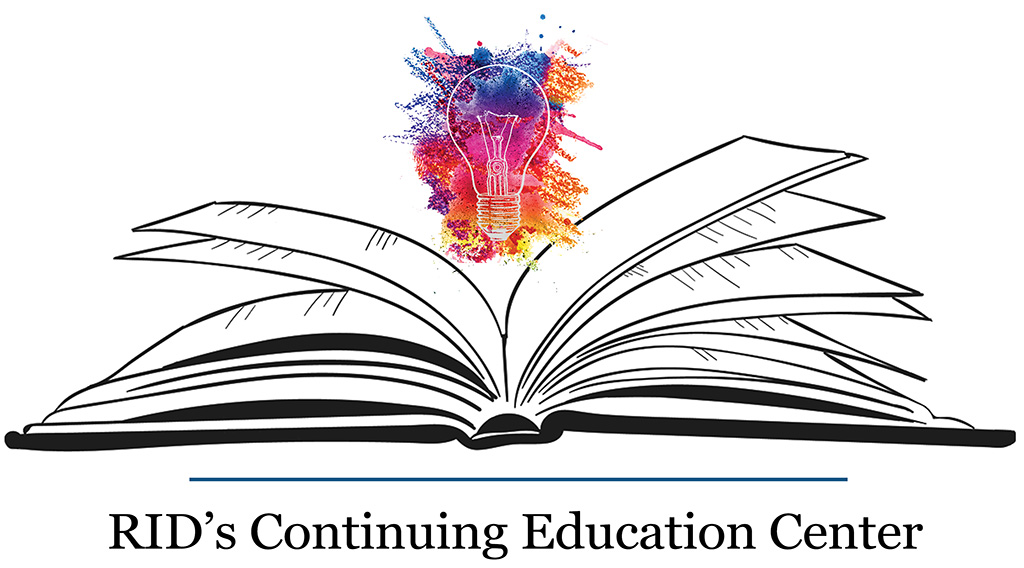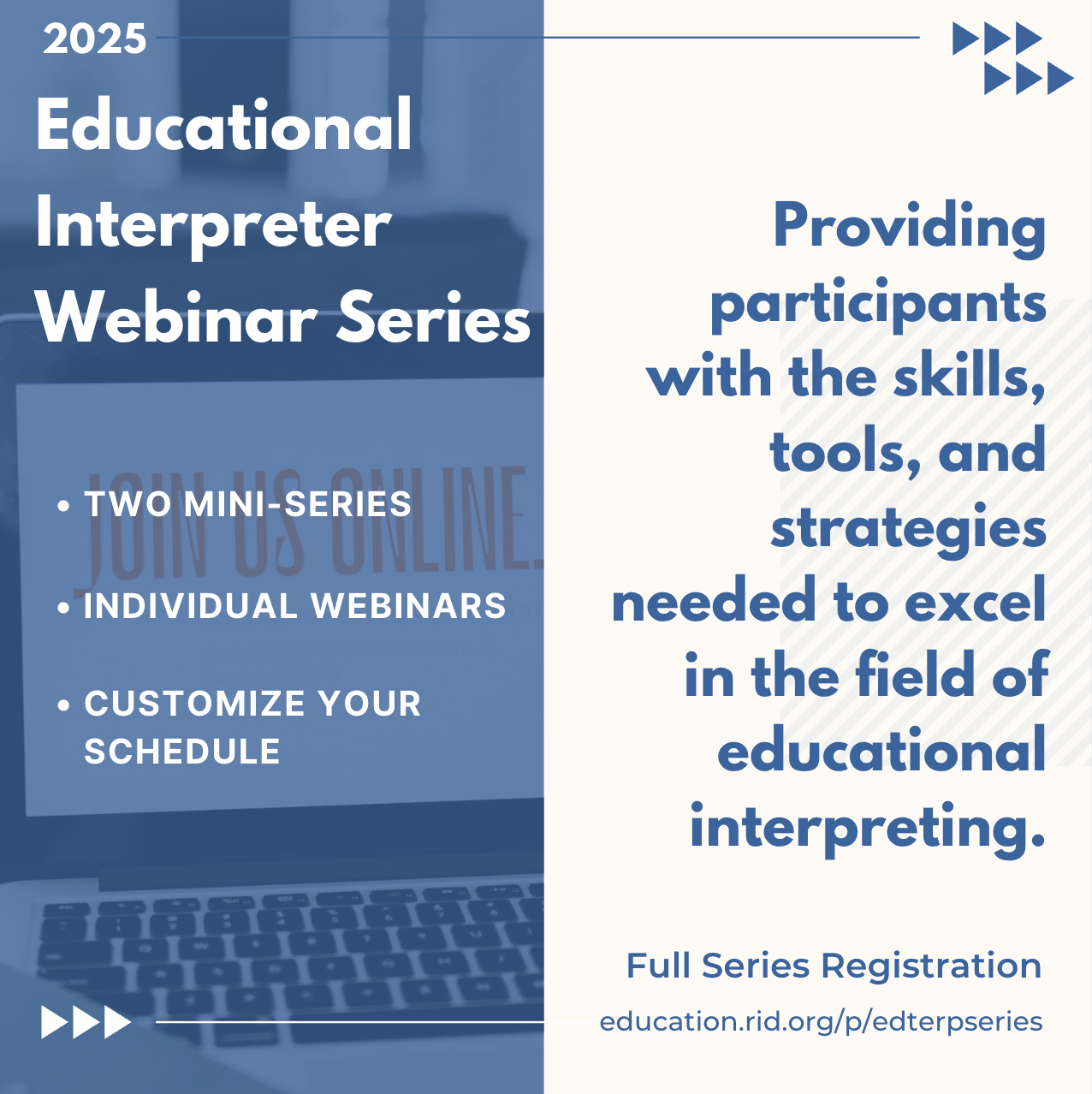
Catalog Advanced Search
-
Includes Credits Includes a Live Web Event on 09/13/2025 at 2:00 PM (EDT)
This Professional Studies program is offered for 0.2 PS CEUs at the little/none Content Knowledge Level. RID HQ is an approved RID CMP Sponsor for continuing education activities. During this roundtable, participants will have the opportunity to learn about the neurodivergent experience, including the stigma and barriers encountered in the interpreting profession. After the panelists share their stories, Amanda and Laura will facilitate the Q&A portion, including questions from the audience. Participants are encouraged to examine their own biases as we discuss the systemic barriers that neurodivergent interpreters experience trying to enter or continue in the interpreting profession. We will also discuss how to incorporate strategies for minimizing barriers and better supporting neurodivergent colleagues.
This Professional Studies program is offered for 0.2 PS CEUs at the little/none Content Knowledge Level. RID HQ is an approved RID CMP Sponsor for continuing education activities.
During this roundtable, participants will have the opportunity to learn about the neurodivergent experience, including the stigma and barriers encountered in the interpreting profession. After the panelists share their stories, Amanda and Laura will facilitate the Q&A portion, including questions from the audience. Participants are encouraged to examine their own biases as we discuss the systemic barriers that neurodivergent interpreters experience trying to enter or continue in the interpreting profession. We will also discuss how to incorporate strategies for minimizing barriers and better supporting neurodivergent colleagues.
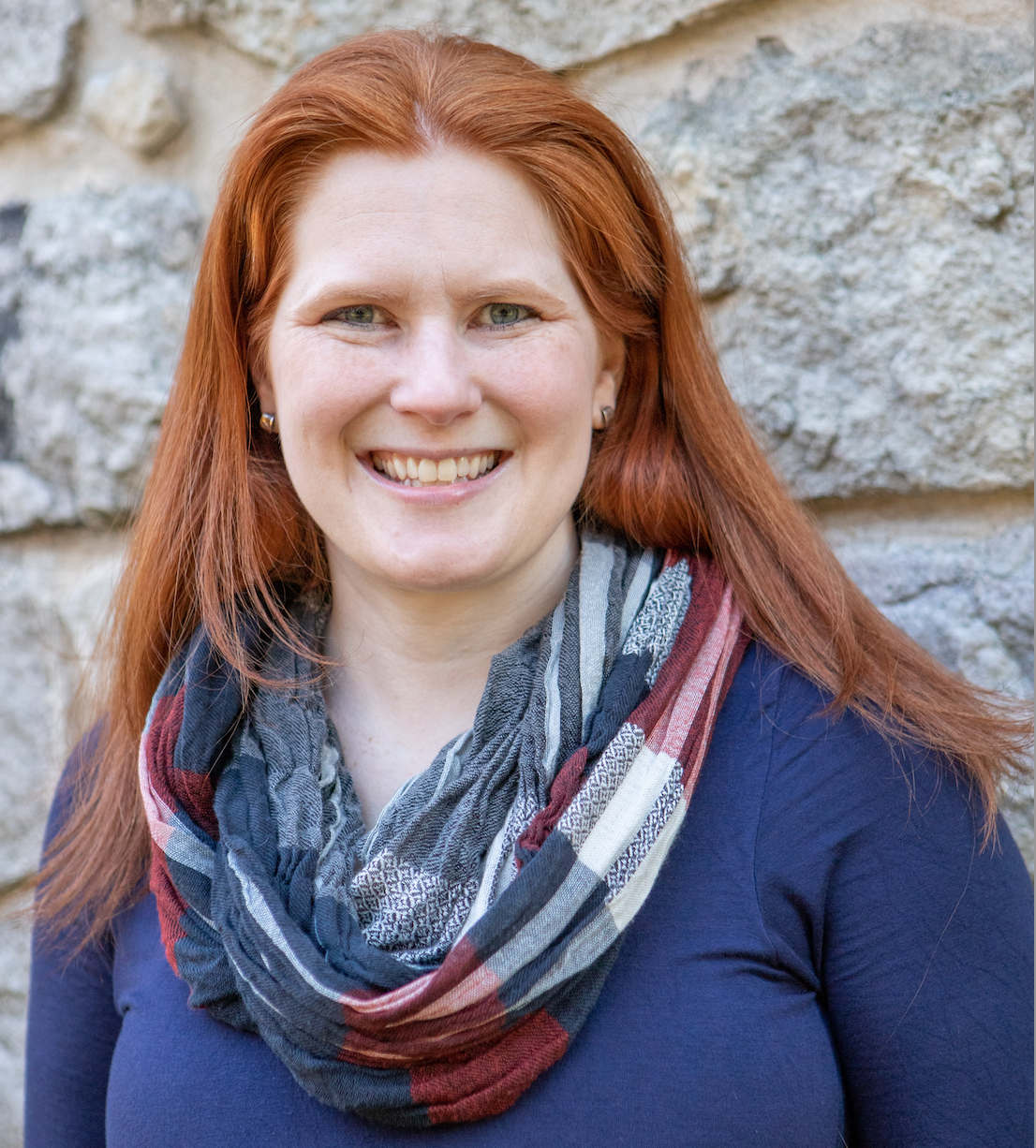
Amanda Kennon (Moderator)
Amanda Kennon, MA, NIC (she/her)
Amanda Kennon, MA, NIC is a freelance interpreter, mentor, and presenter who resides in Southeast PA. She received her B.A. in Interpreting and ASL/ Deaf Studies from Maryville College and her M.A. in. Interdisciplinary Studies: Individualized Studies: Ethics and Interpreting from George Mason University, completing her Capstone Project, “Ethics & Professional Identity: A Proposed Curriculum for Students in Interpreter Education Programs.” During her sixteen-year career, Amanda has worked as staff and freelance in various settings, frequently mentoring students and novice interpreters. Before moving to Pennsylvania, Amanda lived in Northern Virginia and was active with VRID, serving on the Board as District I Representative, Treasurer, and Vice President. During her tenure, she led discussion groups and workshops on ethical decision making; developed the Community Dialogues series, facilitating several sessions; spearheaded the establishment of the VRID Mentorship Task Force; and presented at the 2016 & 2018 VRID Conferences- culminating in the 2018 VRID President’s Award. Additionally, Amanda presented at the 2016 PCRID Conference; provided in-house professional development as a staff interpreter; and published in the RID Views.
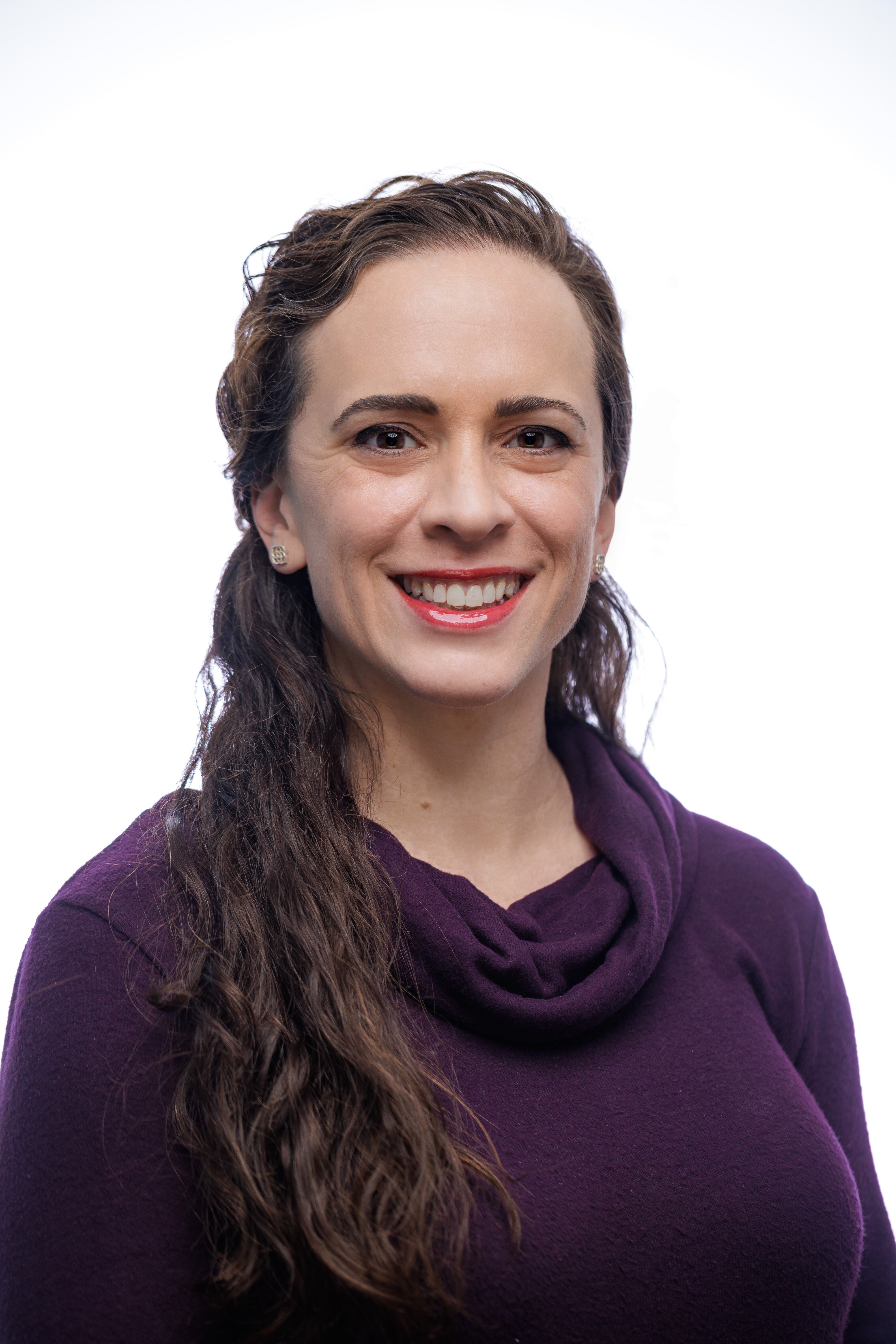
Moderator: Laura Maddox Polhemus
Laura Maddox Polhemus, PhD, NIC Advanced, BEI Advanced
Laura Maddux Polhemus (she/her), PhD, NIC Advanced, BEI Advanced, has been involved with the Deaf community for more than 23 years as an ASL student, interpreter, interpreter educator, and friend. Laura gained her BBA in Business Administration from Sam Houston State University before adding an AAS in Interpreter Training from Tyler Junior College. She studied Applied Linguistics at Texas Tech for her MA, and her thesis focused on having ASL students and Deaf students of English help each other with their language learning from a distance. Laura received her PhD in interpretation from Gallaudet University in 2015, during Her dissertation resulted in a publication, “Source Attribution in ASL-English Interpreter Education: Testing a Method”, with the International Journal of Interpreter Education. While obtaining her PhD she was diagnosed with ADHD, and has been on a journey to discover what that means in her life and work ever since. She has also investigated self-talk in interpreters, and published “The Committee in My Head: Examining Self-Talk of American Sign Language-English Interpreters” in Translation and Interpretation Studies. She has also done research on how novices and experts experience self-talk and how to improve interpreting students’ self-efficacy. Laura was heavily involved in planning and running the 2015 and 2019 World Association of Sign Language Interpreters Conferences. She has presented for CIT, RID, Critical Link, TSID, and more. She is currently an Assistant Professor at Bethel University in Mishawaka, IN where she searches out methods to teach her increasing number of neurodivergent students.
-
Register
- Non-Member - $50
- Member - $40
- More Information
-
Register
-
Includes Credits Includes a Live Web Event on 09/13/2025 at 11:00 AM (EDT)
This Professional Studies program is offered for 0.25 PS CEUs at the little/none Content Knowledge Level. RID HQ is an approved RID CMP Sponsor for continuing education activities. During this interactive workshop, participants will explore neurodivergence in the interpreting, with special attention given to masking and how it can affect neurodivergent individuals. Masking, which is defined as trying to suppress or hide neurodivergent characteristics in order to “pass” as neurotypical, has short- and long-term consequences for neurodivergent consumers and interpreters. It is not always safe for individuals to unmask, particularly for BIPOC and 2SLBQTQIA+ community members, however, as interpreters, we can take actionable steps to understand the neurodivergent experience, examine our own biases, and work towards safer environments for our consumers and colleagues. Through this workshop, Amanda and Laura will share their research about the experiences that neurodivergent interpreters experience while participants engage in small and large group discussions and formulate strategies to better support consumers and colleagues in interpreted interactions.
This Professional Studies program is offered for 0.25 PS CEUs at the little/none Content Knowledge Level. RID HQ is an approved RID CMP Sponsor for continuing education activities.
During this interactive workshop, participants will explore neurodivergence in the interpreting, with special attention given to masking and how it can affect neurodivergent individuals. Masking, which is defined as trying to suppress or hide neurodivergent characteristics in order to “pass” as neurotypical, has short- and long-term consequences for neurodivergent consumers and interpreters. It is not always safe for individuals to unmask, particularly for BIPOC and 2SLBQTQIA+ community members, however, as interpreters, we can take actionable steps to understand the neurodivergent experience, examine our own biases, and work towards safer environments for our consumers and colleagues. Through this workshop, Amanda and Laura will share their research about the experiences that neurodivergent interpreters experience while participants engage in small and large group discussions and formulate strategies to better support consumers and colleagues in interpreted interactions.
At the conclusion of this workshop, participants will be able to:
1. Define neurodiversity, neurodiverse, neurodivergent, and neurotypical;
2. Describe masking and at least three ways it can affect neurodivergent individuals, most notably Deaf consumers and interpreters;
3. Analyze the barriers that neurodivergent interpreters and consumers experience and consider why they may choose to mask or unmask; &
4. Formulate & apply strategies to their interpreted interactions to better support consumers and colleagues.

Amanda Kennon
Amanda Kennon, MA, NIC (she/her)
Amanda Kennon, MA, NIC is a freelance interpreter, mentor, and presenter who resides in Southeast PA. She received her B.A. in Interpreting and ASL/ Deaf Studies from Maryville College and her M.A. in. Interdisciplinary Studies: Individualized Studies: Ethics and Interpreting from George Mason University, completing her Capstone Project, “Ethics & Professional Identity: A Proposed Curriculum for Students in Interpreter Education Programs.” During her sixteen-year career, Amanda has worked as staff and freelance in various settings, frequently mentoring students and novice interpreters. Before moving to Pennsylvania, Amanda lived in Northern Virginia and was active with VRID, serving on the Board as District I Representative, Treasurer, and Vice President. During her tenure, she led discussion groups and workshops on ethical decision making; developed the Community Dialogues series, facilitating several sessions; spearheaded the establishment of the VRID Mentorship Task Force; and presented at the 2016 & 2018 VRID Conferences- culminating in the 2018 VRID President’s Award. Additionally, Amanda presented at the 2016 PCRID Conference; provided in-house professional development as a staff interpreter; and published in the RID Views.
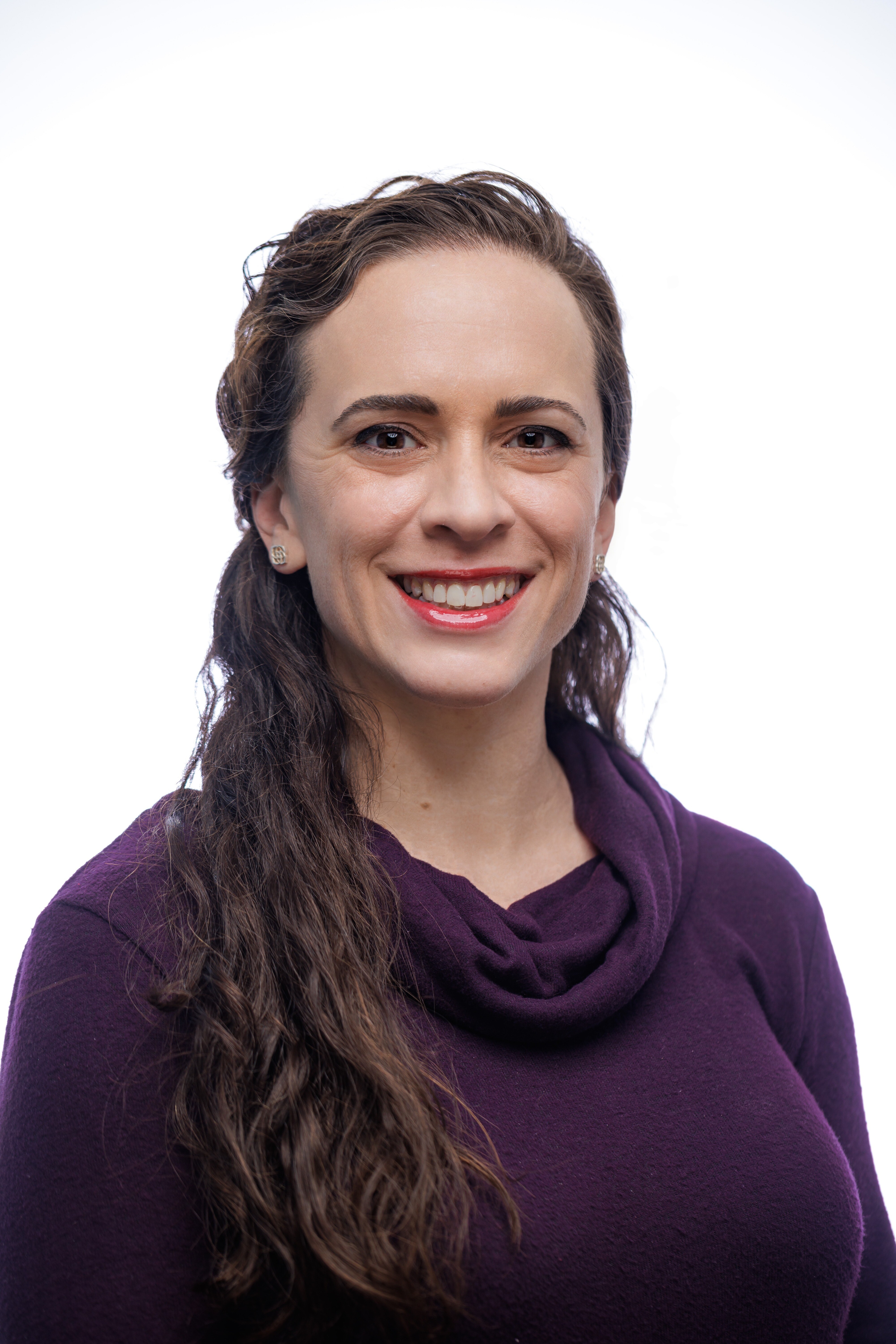
Laura Maddox Polhemus
Laura Maddux Polhemus (she/her), PhD, NIC Advanced, BEI Advanced
Laura Maddux Polhemus (she/her), PhD, NIC Advanced, BEI Advanced, has been involved with the Deaf community for more than 23 years as an ASL student, interpreter, interpreter educator, and friend. Laura gained her BBA in Business Administration from Sam Houston State University before adding an AAS in Interpreter Training from Tyler Junior College. She studied Applied Linguistics at Texas Tech for her MA, and her thesis focused on having ASL students and Deaf students of English help each other with their language learning from a distance. Laura received her PhD in interpretation from Gallaudet University in 2015, during Her dissertation resulted in a publication, “Source Attribution in ASL-English Interpreter Education: Testing a Method”, with the International Journal of Interpreter Education. While obtaining her PhD she was diagnosed with ADHD, and has been on a journey to discover what that means in her life and work ever since. She has also investigated self-talk in interpreters, and published “The Committee in My Head: Examining Self-Talk of American Sign Language-English Interpreters” in Translation and Interpretation Studies. She has also done research on how novices and experts experience self-talk and how to improve interpreting students’ self-efficacy. Laura was heavily involved in planning and running the 2015 and 2019 World Association of Sign Language Interpreters Conferences. She has presented for CIT, RID, Critical Link, TSID, and more. She is currently an Assistant Professor at Bethel University in Mishawaka, IN where she searches out methods to teach her increasing number of neurodivergent students.
-
Register
- Non-Member - $60
- Member - $50
- More Information
-
Register
-
Includes Credits
*Note - this activity will only be accessible 6/1/2025-8/31/2025. Please plan to register for AND complete the course during that 3-month window. * This Professional Studies program is offered for 0.2 PS CEUs at the little/none Content Knowledge Level. RID HQ is an approved RID CMP Sponsor for continuing education activities. This workshop will reveal the answers to the most common questions interpreters ask about LLCs, including: Do I need an LLC? How do I form an LLC? What is liability insurance? Does an LLC provide tax savings? What is an EIN? How are sole proprietorships and S Corps different? In addition, we will examine several real-life scenarios to help interpreters evaluate whether an LLC is right for them.
*Note - this activity will only be accessible 6/1/2025-8/31/2025. Please plan to register for AND complete the course during that 3-month window. *
This Professional Studies program is offered for 0.2 PS CEUs at the little/none Content Knowledge Level. RID HQ is an approved RID CMP Sponsor for continuing education activities.
This workshop will reveal the answers to the most common questions interpreters ask about LLCs, including: Do I need an LLC? How do I form an LLC? What is liability insurance? Does an LLC provide tax savings? What is an EIN? How are sole proprietorships and S Corps different? In addition, we will examine several real-life scenarios to help interpreters evaluate whether an LLC is right for them.
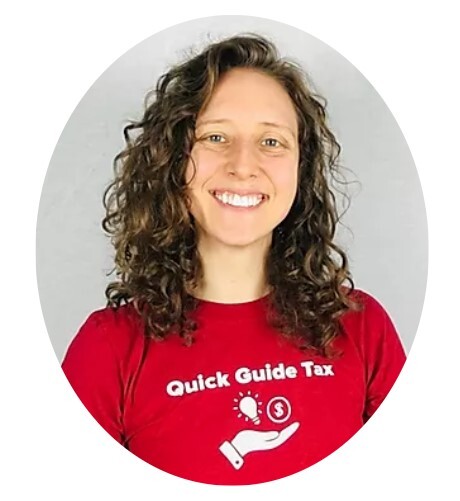
Rosemary Bocian, MA, EA, NIC
Rosemary Bocian, MA, EA, NIC, has been an ASL freelance interpreter since 2011. In 2017 she co-authored the book "The Interpreter's Quick Guide to Self-Employment" which is currently being used by Interpreter Training Programs nationwide and sold on Amazon as well as at select Barnes & Nobles locations. Following publication, she began teaching workshops across the nation including the 2019 RID National Conference. This inspired her to become an Enrolled Agent and support interpreters directly by providing tax preparation services through her business Quick Guide Tax. Rosemary received both her Bachelor’s in ASL Interpretation and Master’s in Deaf Studies: Culture from Gallaudet University. As a professional tax preparer (EA), author and seasoned speaker, Rosemary presents the complex world of taxes in plain language so that interpreters can thrive in the profession.
-
Register
- Non-Member - $50
- Member - $35
- More Information
-
Register
-
This series of three webinars is designed to address critical issues within the world of sign language interpretation in educational settings, particularly from a socio-cultural perspective. The series aims to challenge assumptions, uncover hidden biases, and offer actionable strategies for creating more inclusive and supportive environments for Deaf and hard-of-hearing individuals in educational settings.
This series of three webinars is designed to address critical issues within the world of sign language interpretation in educational settings, particularly from a socio-cultural perspective. The series aims to challenge assumptions, uncover hidden biases, and offer actionable strategies for creating more inclusive and supportive environments for Deaf and hard-of-hearing individuals in educational settings.
-
Register
- Non-Member - $225
- Member - $160
- More Information
-
Register
-
Includes Credits
This Professional Studies program is offered for 0.3 PS CEUs at the little/none Content Knowledge Level. RID HQ is an approved RID CMP Sponsor for continuing education activities. With a lens of addressing allyship as it pertains to the Deaf community, the presenter will take a deep dive into the underlying principles and ideologies of allyship, including in-depth discussions on supportive and performative allyship. Understanding the allyship framework will allow us to better explore context-specific applications of the framework, as well as identify necessary steps and behaviors individuals should take to cultivate and drive meaningful change.
This Professional Studies program is offered for 0.3 PS CEUs at the little/none Content Knowledge Level. RID HQ is an approved RID CMP Sponsor for continuing education activities.
With a lens of addressing allyship as it pertains to the Deaf community, the presenter will take a deep dive into the underlying principles and ideologies of allyship, including in-depth discussions on supportive and performative allyship. Understanding the allyship framework will allow us to better explore context-specific applications of the framework, as well as identify necessary steps and behaviors individuals should take to cultivate and drive meaningful change.

Corey Axelrod
Corey Axelrod
Corey Axelrod founded 2axend in 2017 after observing the challenges his father, Rick Axelrod, faced when advocating as a Deaf individual for his right to quality communication access in healthcare during his tumultuous battle with Multiple Myeloma, an incurable cancer of the bone marrow.
As a member of a multigenerational Deaf family, Corey has been long exposed to the various systemic barriers impacting his family and the greater Deaf and hard of hearing community. Corey is committed to eliminating these barriers and guiding organizations to create equitable experiences for his community.
Corey also currently sits on Northwest Community Hospital’s Patient and Family Advisory Council and serves as a member of the ASTM International F43.06 Subcommittee on Captioning Standards. In June 2021, Corey completed his third-term as president of the Illinois Association of the Deaf, Illinois’ leading civil rights organization of, by and for Deaf and Hard of Hearing Illinoisans.
After this interactive workshop, participants will:
1. Recognize a minimum of three impacts of their own actions and behaviors.
2. Identify a minimum of three ways Deaf and hard of hearing individuals may perceive supportive and performative allies.
3. Identify a minimum of three reasons why some actions and behaviors are more effective than others.
-
Register
- Non-Member - $95
- Member - $70
- More Information
-
Register
-
Note - not all sessions in this series will be recorded. Please note which sessions you must attend live to earn credit to ensure you are able to attend those sessions. Designed specifically for interpreters working in educational settings, this series focuses on equipping participants with the skills, tools, and strategies needed to excel in the field of educational interpreting. Interpreters will focus on building expertise, confidence, and adaptability in order to meet the diverse needs of all consumers. Each session addresses the unique challenges and opportunities in K-12 environments, combining practical techniques with theoretical foundations. Key topics include language development and pedagogy, ethics and professional standards, cultural competence and inclusion, role-space and boundaries, & self-care and professional resilience. Participants will engage in interactive activities, discussions, and hands-on practice to strengthen their skills and confidence. Whether you're new to educational interpreting or looking to refine your expertise, this series will provide invaluable tools and resources to enhance your professional practice.
Purpose of this Series
Designed specifically for interpreters working in educational settings, this series focuses on equipping participants with the skills, tools, and strategies needed to excel in the field of educational interpreting. Interpreters will focus on building expertise, confidence, and adaptability in order to meet the diverse needs of all consumers. Each session addresses the unique challenges and opportunities in K-12 environments, combining practical techniques with theoretical foundations. Key topics include language development and pedagogy, ethics and professional standards, cultural competence and inclusion, role-space and boundaries, & self-care and professional resilience. Participants will engage in interactive activities, discussions, and hands-on practice to strengthen their skills and confidence. Whether you're new to educational interpreting or looking to refine your expertise, this series will provide invaluable tools and resources to enhance your professional practice.
Registration Information
Individuals can register for this series in a number of ways.
Full series: This registration option includes all 9 sessions, listed under the "Schedule-At-A-Glance" tab.
Individual Workshops: Each session has its own registration link if you are interested in only attending a couple, or less, of these webinars.
Mini-series #1: This registration option includes 3 webinars, presented by Corey Axelrod, that focuses on the consumer experience in K12 settings. These sessions will be recorded for asynchronous viewing if you cannot attend live. The link to register for these 3 sessions only is: https://education.rid.org/p/mi...
Mini-series #2: This registration option includes 3 webinars, presented by Monique Champagne, that focuses on mental health interpreting in K12 settings. These sessions will not be recorded for asynchronous viewing and require live attendance to earn credit. Please plan to attend the full session with a functioning camera, as live participation is required for all three sessions. The link to register for these 3 sessions only is: https://education.rid.org/p/mi...
Technology Requirements
*Note - "Due to the nature of the content and active participation required, some sessions within this series will not be recorded for asynchronous learning. For those who attend those live, unrecorded sessions, please use a laptop or desktop computer with a camera - other smart, handheld devices are not sufficient. Ensure you are able to attend any live sessions that we are not recording as we are not able to offer refunds for this error on registrants' part. *
Disclaimer
For live sessions that are not being recorded, please ensure you have a functioning camera on a desktop or laptop device. Handheld electronics will not be sufficient for these sessions and refunds will not be issued for this oversight on the part of the participant.
March 20, 2025
Rethinking the Binary Paradigm in Interpreting Corey Axelrod | 6-9 pm ET | 0.30 PS CEUs
March 27, 2025
Mitigating Ableism Within Educational Settings Corey Axelrod | 6-9 pm ET | 0.30 PS CEUs
April 3, 2025
Reframing the Language of Allyship Corey Axelrod | 6-9 pm ET | 0.30 PS CEUs
May 1, 2025
Mental Health Where? Interpreting Mental Health Topics in Education Monique Champagne | 6-9:30 pm ET | 0.35 PS CEUs
May 8, 2025
Movement Deletion & Hold Reduction in ASL Jaime Marshall | 6-9 pm ET | 0.30 PS CEUs
May 15, 2025 - capped at 75 registrations
Trauma-Informed Interpreting in Educational Settings Monique Champagne | 6-9:30 pm ET | 0.35 PS CEUs
May 29, 2025 - capped at 75 registrations
Managing Secondary Stress for Educational Interpreters Monique Champagne | 6-9:30 pm ET | 0.35 PS CEUs
June 5, 2025
The Interpreter Role in the Classroom (Registration coming soon!) Dr. Lisa Prinzi & Danny Maffia | 6-9 pm ET | 0.30 PS CEUs
June 12, 2025
Language Deprivation (Registration coming soon!) Dr. Wyatte Hall | 6-9 pm ET | 0.30 PS CEUs
-
Register
- Non-Member - $750
- Member - $500
- More Information
-
Register
-
Includes Credits
This Professional Studies program is offered for 0.3 PS CEUs at the little/none Content Knowledge Level. RID HQ is an approved RID CMP Sponsor for continuing education activities. This workshop addresses the demands faced by educational interpreter's and deaf students' autonomy in mainstream classrooms. It explores deaf individuals' and interpreters' perspectives on the interpreters' role and responsibilities, student autonomy, and working together in the K-12 setting taken from individual and group interviews. This workshop highlights issues deaf students and interpreters face, such as positioning and role confusion. In addition, this workshop examines the educational team and their understanding and perspectives regarding role, shared values, responsibilities, and collaboration. Finally, by sharing deaf individuals' and interpreters' perspectives and experiences, group discussion, and case conferencing, this workshop aims to share strategies for enhancing interpersonal communication and collaboration between educational team members to better support deaf students in the mainstream.
This Professional Studies program is offered for 0.3 PS CEUs at the little/none Content Knowledge Level. RID HQ is an approved RID CMP Sponsor for continuing education activities.
This workshop addresses the demands faced by educational interpreter's and deaf students' autonomy in mainstream classrooms. It explores deaf individuals' and interpreters' perspectives on the interpreters' role and responsibilities, student autonomy, and working together in the K-12 setting taken from individual and group interviews. This workshop highlights issues deaf students and interpreters face, such as positioning and role confusion. In addition, this workshop examines the educational team and their understanding and perspectives regarding role, shared values, responsibilities, and collaboration. Finally, by sharing deaf individuals' and interpreters' perspectives and experiences, group discussion, and case conferencing, this workshop aims to share strategies for enhancing interpersonal communication and collaboration between educational team members to better support deaf students in the mainstream.
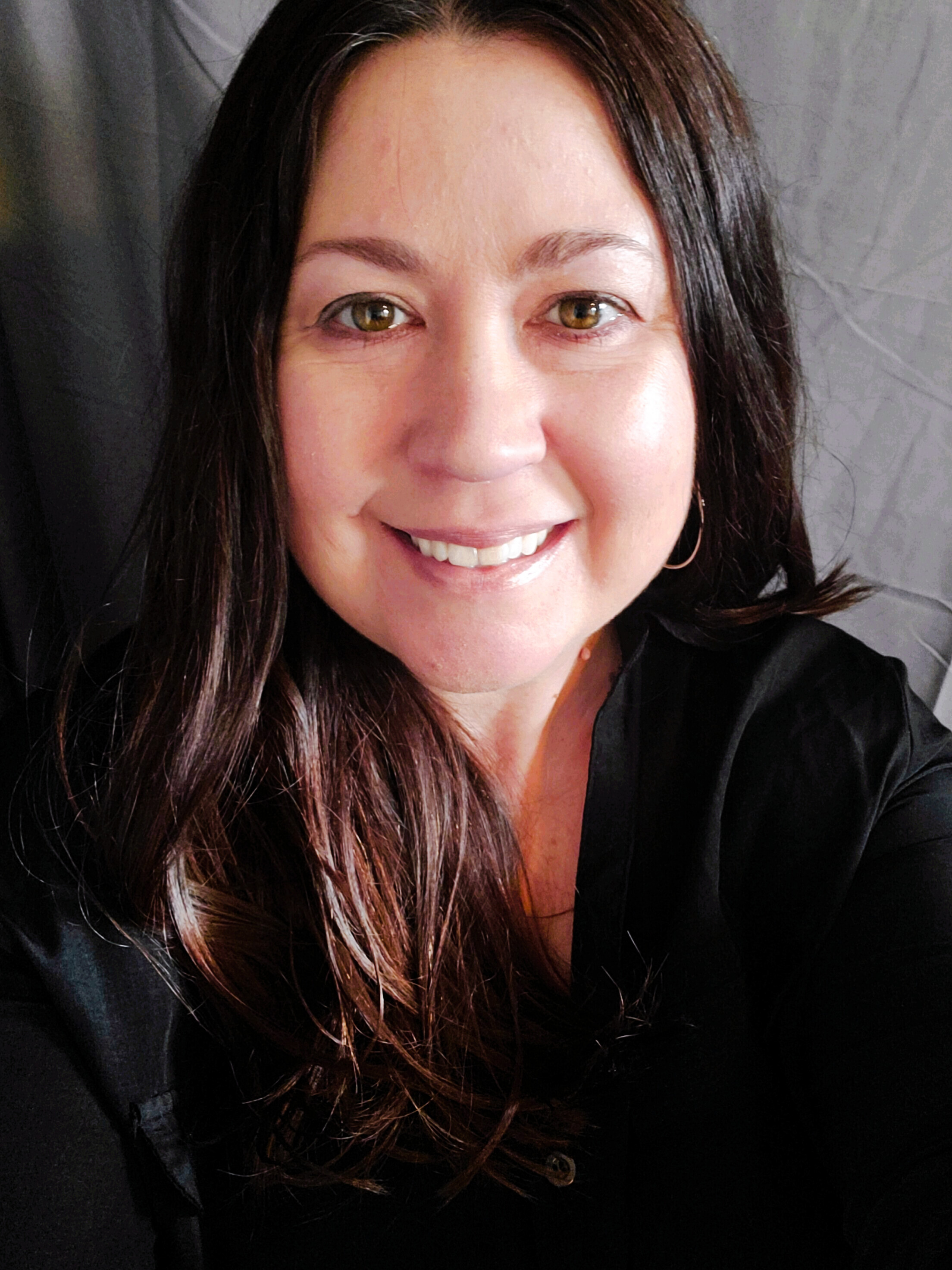
Dr. Lisa Prinzi
Lisa Prinzi, PhD
Dr. Lisa Prinzi has worked as an interpreter for more than 20 years with specialized training in educational interpreting and as an interpreter educator for eight years. Lisa is an Assistant Professor in the Department of American Sign Language and Interpreting Education (ASLIE) at the Rochester Institute of Technology’s National Technical Institute for the Deaf (RIT/NTID). She teaches core interpreting skills courses in the bachelor’s degree program and courses in the Certificate in Educational Interpreting. Her research focuses on interpreting in educational environments and professional development for educational interpreters.
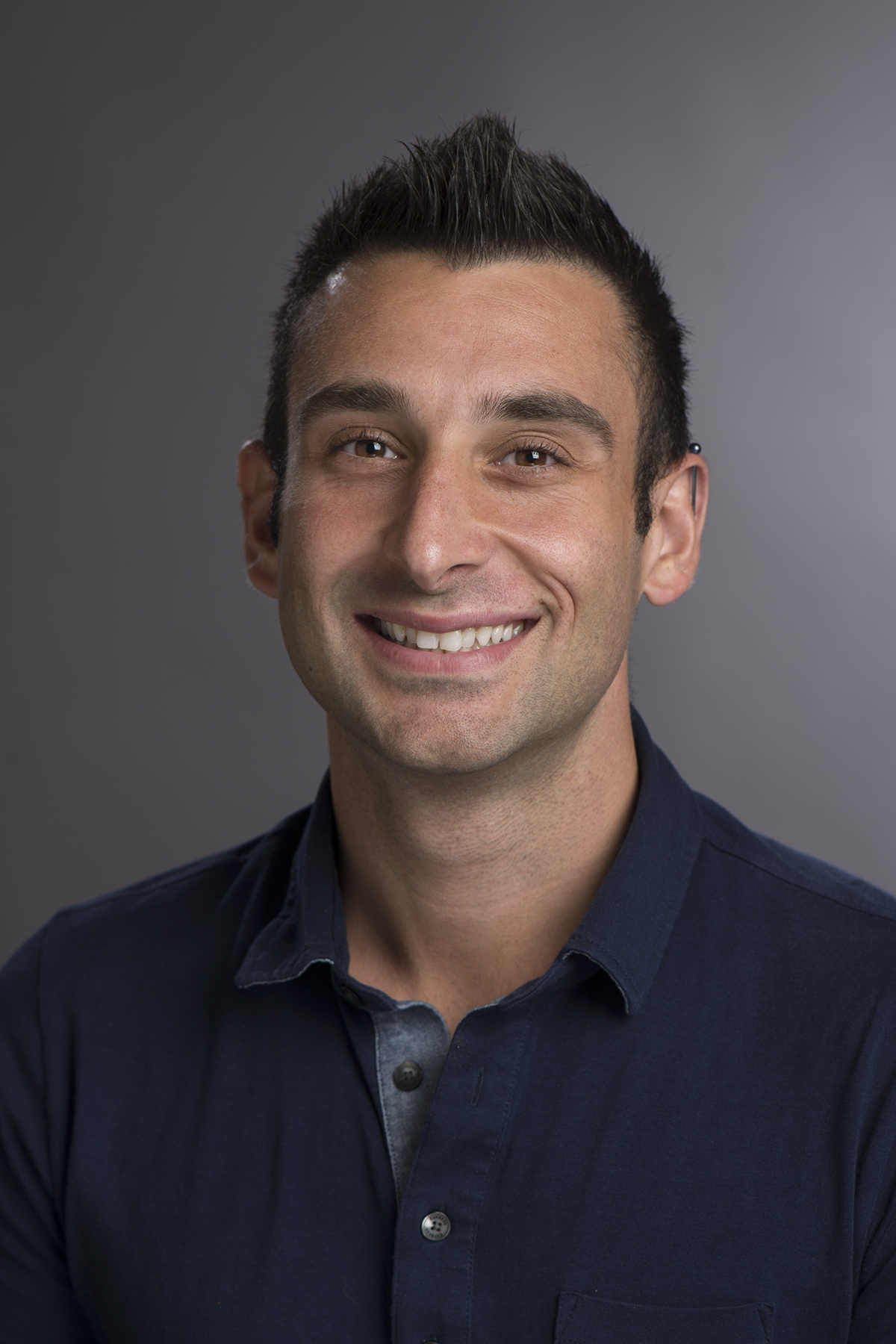
Danny Maffia
Danny Maffia
Daniel Maffia is the interpreting program director, practicum coordinator, and a lecturer with the department of American Sign Language and English Interpreting Department’s Interpreter Education Program at the National Technical Institute for the Deaf teaching at both the Bachelors and Master's degree level. He obtained his bachelor's degree in Interpreting at the Rochester Institute of Technology in 2009. In 2010 he became certified and in 2014 earned his Masters in Interpreting Studies with an emphasis in Teaching Interpreting from Western Oregon University. Daniel served as a staff interpreter in the Department of Access Services at the Rochester Institute of Technology. Daniel continues interpreting as a video and community interpreter. Daniel is the co-author of the Introduction to VRS Curriculum Guide book. He is currently the Vice President of CCIE.. Daniel’s research interests relate to reflective practice, Demand-Control Schema, and self-care in which he presents workshops for interpreters nationally and internationally.
-
Register
- Non-Member - $95
- Member - $70
- More Information
-
Register
-
Includes Credits
This Professional Studies program is offered for 0.15 PS CEUs at the little/none Content Knowledge Level. RID HQ is an approved RID CMP Sponsor for continuing education activities. Join us in exploring a piece of Deaf History by learning more about the remarkable life and legacy of William "Dummy" Hoy, one of baseball's most influential yet often overlooked figures. We will delve into the historical research surrounding Hoy's career, his impact on the sport, and the challenges he overcame as a Deaf player in professional baseball. Not only was he a skilled outfielder who was a pioneering athlete that helped shape the use of hand signals in baseball but changed accessibility in sports on a broad scale. Hoy and this webinar are game-changers!
This Professional Studies program is offered for 0.15 PS CEUs at the little/none Content Knowledge Level. RID HQ is an approved RID CMP Sponsor for continuing education activities.
Join us in exploring a piece of Deaf History by learning more about the remarkable life and legacy of William "Dummy" Hoy, one of baseball's most influential yet often overlooked figures. We will delve into the historical research surrounding Hoy's career, his impact on the sport, and the challenges he overcame as a Deaf player in professional baseball. Not only was he a skilled outfielder who was a pioneering athlete that helped shape the use of hand signals in baseball but changed accessibility in sports on a broad scale. Hoy and this webinar are game-changers!
Upon completion of this session, participants will:
1. Summarize at least three key contributions Dummy Hoy made to baseball & Deaf history, &
2. Discern how Hoy's career influenced the development of hand signals in baseball and identify one way his legacy continues to impact the sport today.
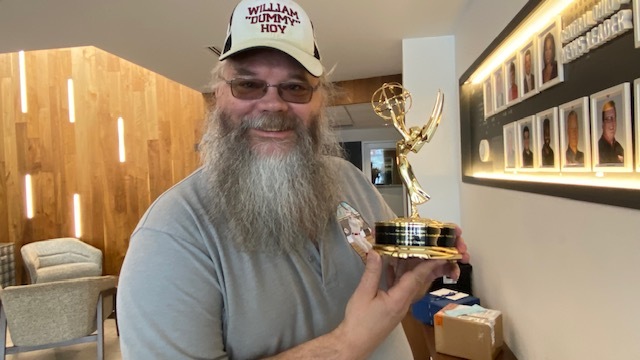
Steve Sandy
Associate Producer/Researcher
Steve Sandy, like Hoy, is Deaf. Steve attended Model Secondary School for the Deaf and Gallaudet University in Washington, DC and then went to work for the Federal Government where he has worked for the past 23 years. He is currently with the Defense Finance and Accounting Service-Columbus - Defense Commissary Agency as a researcher and lead and is also a finalist for the FEA handicap federal Employee of the Year.
For the past eighteen years Steve has done extensive research on his idol, Dummy Hoy.In 1989, Steve became President of the Ohio Association of the Deaf, a statewide advocacy group that was founded in 1940 as the Ohio Deaf Motorist Association. Among items on the organization's agenda was a measure supporting Hoy's inclusion in the Baseball Hall of Fame in Cooperstown, NY.Steve was one of the people who were instrumental in getting Dummy Hoy inducted into the Cincinnati Reds Hall of Fame.
-
Register
- Non-Member - $30
- Member - $20
- More Information
-
Register
-
Includes Credits
This Professional Studies program is offered for 0.3 PS CEUs at the little/none Content Knowledge Level. RID HQ is an approved RID CMP Sponsor for continuing education activities. As ableism is embedded in many of our social structures, Deaf and hard of hearing individuals are often on the receiving end of such behaviors. The majority of these attitudes, stereotypes and stigmas are a byproduct of people having limited exposure to or awareness of Deaf and hard of hearing individuals. However, there are unfortunate instances in which interpreters may inadvertently exacerbate institutional ableism and perpetuate systemic ableism in educational settings. To address and counter these often-unintentional behaviors, the presenter will discuss potential root causes of ableism within educational settings.
This Professional Studies program is offered for 0.3 PS CEUs at the little/none Content Knowledge Level. RID HQ is an approved RID CMP Sponsor for continuing education activities.
As ableism is embedded in many of our social structures, Deaf and hard of hearing individuals are often on the receiving end of such behaviors. The majority of these attitudes, stereotypes and stigmas are a byproduct of people having limited exposure to or awareness of Deaf and hard of hearing individuals. However, there are unfortunate instances in which interpreters may inadvertently exacerbate institutional ableism and perpetuate systemic ableism in educational settings. To address and counter these often-unintentional behaviors, the presenter will discuss potential root causes of ableism within educational settings.

Corey Axelrod
Corey Axelrod
Corey Axelrod founded 2axend in 2017 after observing the challenges his father, Rick Axelrod, faced when advocating as a Deaf individual for his right to quality communication access in healthcare during his tumultuous battle with Multiple Myeloma, an incurable cancer of the bone marrow.
As a member of a multigenerational Deaf family, Corey has been long exposed to the various systemic barriers impacting his family and the greater Deaf and hard of hearing community. Corey is committed to eliminating these barriers and guiding organizations to create equitable experiences for his community.
Corey also currently sits on Northwest Community Hospital’s Patient and Family Advisory Council and serves as a member of the ASTM International F43.06 Subcommittee on Captioning Standards. In June 2021, Corey completed his third-term as president of the Illinois Association of the Deaf, Illinois’ leading civil rights organization of, by and for Deaf and Hard of Hearing Illinoisans.
After this training, participants will be able to:
1. Identify a minimum of three differences between institutional ableism and systemic ableism.
2. List a minimum of three ways ableism can impact Deaf and hard of hearing students.
3. Utilize a minimum of two strategies to interrupt, counter, and dismantle ableist microaggressions and behaviors.
-
Register
- Non-Member - $95
- Member - $70
- More Information
-
Register
-
Includes Credits
This Professional Studies program is offered for 0.3 PS CEUs at the little/none Content Knowledge Level. RID HQ is an approved RID CMP Sponsor for continuing education activities. We live in a world heavily influenced by either/or, us or them, and Deaf or hearing thinking. In the context of sign language interpretation in educational settings, this binary mind-set is often exclusionary of situational and socio-cultural considerations that may heavily impact interpreting outcomes. To address this critical shortcoming and identify potential solutions, the presenter will facilitate a conversation that explores and challenges a variety of assumptions, models, values and standard methods shared by interpreting professionals, interpreting educators, and interpreting agency representatives.
This Professional Studies program is offered for 0.3 PS CEUs at the little/none Content Knowledge Level. RID HQ is an approved RID CMP Sponsor for continuing education activities.
We live in a world heavily influenced by either/or, us or them, and Deaf or hearing thinking. In the context of sign language interpretation in educational settings, this binary mind-set is often exclusionary of situational and socio-cultural considerations that may heavily impact interpreting outcomes. To address this critical shortcoming and identify potential solutions, the presenter will facilitate a conversation that explores and challenges a variety of assumptions, models, values and standard methods shared by interpreting professionals, interpreting educators, and interpreting agency representatives.

Corey Axelrod
Corey Axelrod
Corey Axelrod founded 2axend in 2017 after observing the challenges his father, Rick Axelrod, faced when advocating as a Deaf individual for his right to quality communication access in healthcare during his tumultuous battle with Multiple Myeloma, an incurable cancer of the bone marrow.
As a member of a multigenerational Deaf family, Corey has been long exposed to the various systemic barriers impacting his family and the greater Deaf and hard of hearing community. Corey is committed to eliminating these barriers and guiding organizations to create equitable experiences for his community.
Corey also currently sits on Northwest Community Hospital’s Patient and Family Advisory Council and serves as a member of the ASTM International F43.06 Subcommittee on Captioning Standards. In June 2021, Corey completed his third-term as president of the Illinois Association of the Deaf, Illinois’ leading civil rights organization of, by and for Deaf and Hard of Hearing Illinoisans.
Upon completion of this webinar, participants will have or be able to:
1. Discussed a minimum of three ways that binary thinking may impact various elements of the interpreting process.
2. Utilize a minimum of three strategies to mitigate the impact of binary thinking.
3. Identify a minimum of three opportunities to leverage the benefits of spectrum thinking as it pertains to interpreting.
-
Register
- Non-Member - $95
- Member - $70
- More Information
-
Register
